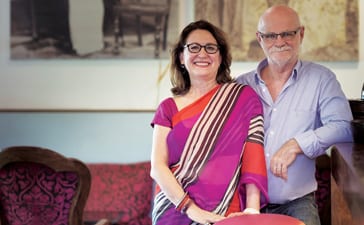Home is where the heart is

Joerg Drechsel and Txuku, founders and directors of Malabar Escapes have reinvented luxury travel in Kerala through the unique experiences showcasing the arts, crafts and culture of the state to their global clientele By Sudipta Dev
Born in Germany, Joerg Drechsel fell in love with India when he travelled across the country in 1972. Almost two decades later he returned here with his Spanish wife Txuku and bought a heritage bungalow in Fort Cochin and converted it into a hotel. Malabar House is the first Relais & Chateaux member in India, and Drechsel is both the chairman of the Asian chapter of Relais & Chateaux and the joint secretary, Indian Heritage Hotels’ Association. In the last two decades as the Drechsels showcased the best of Kerala before the world through their beautiful properties and the unique experiences of Malabar Escapes, they created a special place for themselves in Kerala’s travel and tourism industry.
Talking about what inspired him to start Malabar Escapes when Kerala was nowhere on the international tourism map, Drechsel says, “I came the first time as a young man to Fort Cochin and was blown away. The location along the old port, dotted with Chinese nets, the layers of history surrounding me and a lifestyle formed by a composite culture, the whole mix was and is inspiring. When we, my wife Txuku and I, bought the Malabar House in 1995, Fort Cochin seemed to be a dying city with business houses moving out and the Anglo Indian population migrating.” He reminds that today Fort Cochin is a destination magnet, full of boutique hotels and home stays, art galleries and the fabulous biennale, lifestyle shopping and diverse dining experiences. “My wife and I take great pride that we started this revival,” he states.
When queried on how tough it has been for a foreign national to create a niche in the chaotic world of India’s travel industry, Drechsel comments, “Coming from a design background, we were very clear what we wanted – small hotels that create personalised comforts and showcase the best of local culture, combining heritage through inherited craft skills with exiting contemporary design.” He acknowledges that to realise this was not easy, in particular in the initial stages when they had to navigate through the administrative labyrinth to obtain all required permits without violating the law. Not surprisingly, for the Drechsels, it was a cultural crash course.
Many milestones
There have of course been many milestones in the last two decades – state tourism awards, five national tourism awards, World Travel Award last year, the first Green Globe certification in India, among others. “All these accolades have been milestones,” adds Drechsel.
And, what according to him have been the greatest learnings? “My wife and I had both no hospitality background when we started Malabar Escapes, nor were we accustomed to the Indian legal and business system. It was learning by doing. We got a lot of personal support on this route – Amitabh Kant and Dr Venu – both at some stage secretaries of tourism encouraged us. Dipak Deva, today CEO of Kuoni destination management, met us at an early stage and realised that we can create something new. Jose Dominic and his brothers, owners of CGH Earth, have given us a lot of valuable advice and the Indian Heritage Hotels Association, under the guidance of its president, HH Gaj Singhji of Jodhpur and the general secretary, Randhir Vikram Singh Mandawa took me with open arms into their executive committee,” he says, adding that, the late HN Sanghvi, chartered accountant and finance director in their company, taught them Indian business practices, financial planning and prudence. “This is a long list, and many are still missing, but the learning is that you should look out for people who understand your way of thinking and doing and then have confidence in them. We learned a lot about integrity and loyalty,” asserts Drechsel.
Every time the Drechsels return to India, the immigrations officer takes their passports and asks them when they will leave the country and return. “We explain that we are actually coming home since we have been living and working for more them two decades in Kochi,” he says, not forgetting to add that India has welcomed them with open arms. “But we wish that there will be in future a tool similar to the Green Card, which recognises us as people living and working in India and contributing to its growth.”
In the future, Drechsel wants to add more personalised experiences for guests into Malabar Escapes circuit and add a few new destinations. “As a person and the creative director, I want to focus more on my core skill as a ‘taste maker’, focusing on the development of crafted architecture and design rooted in the vernacular crafts vocabulary,” he states.
Drechsel advises the next generation in the industry to develop new destinations instead of adding more room capacity to existing destinations. “India is full of exiting opportunities. Instead of copying others, develop your own vocabulary and identity. Work with the principles of responsible tourism and create activities which interlink the guests with the host community,” he adds with conviction. His single biggest wish for the growth of inbound tourism is that the central government relaxes and simplifies the visa rules. “This will make a huge difference since there is a great capacity for growth,” he asserts.

